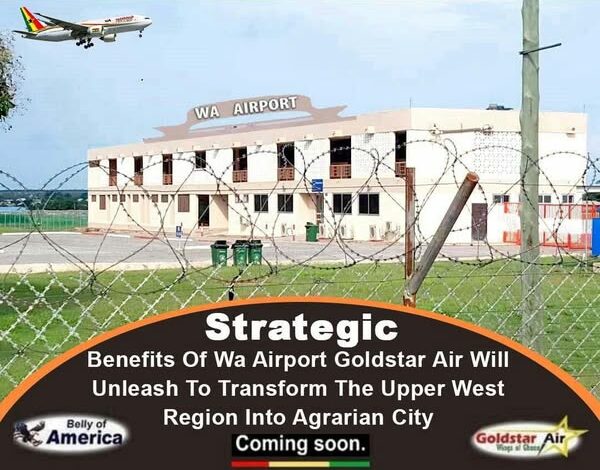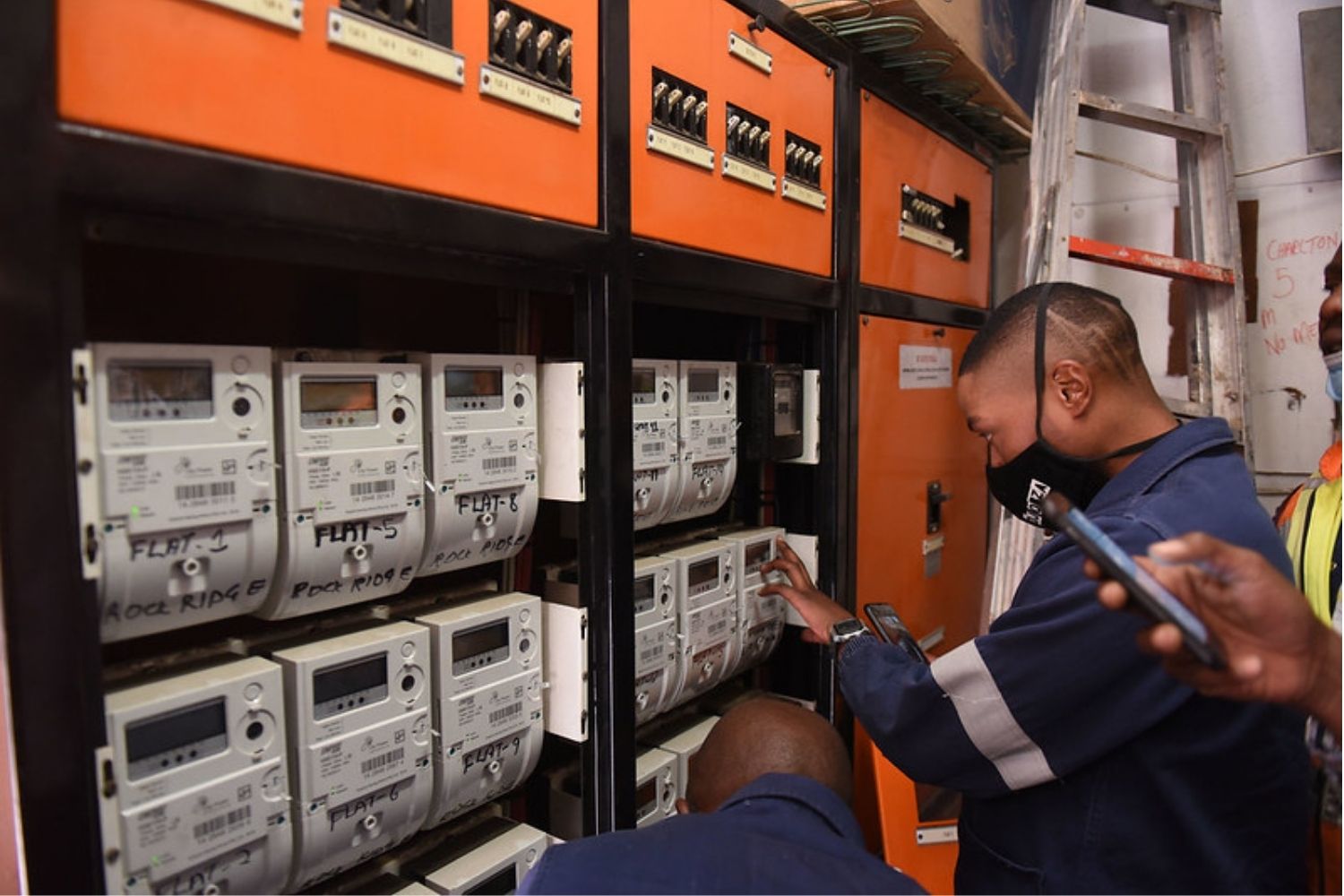Strategic Benefits Of Wa Airport Goldstar Air Will Unleash To Transform The Upper West Region Into An Agrarian City

International airline Goldstar Air, a private Ghanaian and United States registered company with an issued Air Carrier Licence (ACL/N-SCH No. 0239) from the Ghana Civil Aviation Authority to operate passenger and cargo flights across West Africa and intercontinental routes, will unleash a strategic deployment of the airline’s operations at Wa Airport (WZA), with pivotal opportunity to ignite a reset of economic transformation across the Upper West Region of Ghana.
Goldstar Air, the wings of Ghana and the belly of America, will be initiating a biweekly (every 2 weeks) employee pay structure in Ghana. This initiative will align with the salary structures of the airline’s other destinations to avoid employment discrimination and will be the first of its kind in the aviation sector in the country. According to the North America Airports Council International, commercial service airports in the United States supports 12.8 million jobs.
The Upper West Region stands on the threshold of becoming a 24-hour agrarian city of national importance through reliable air connectivity, rapid cargo movement, and business stimulation. Goldstar Air’s presence at Wa Airport is poised to trigger expansive growth in agriculture, tourism, agribusiness, infrastructure, education, and investment. This transformation initiative aims to reverse the historical marginalization of the region and fully integrate it into Ghana’s economic mainstream.
Goldstar Air has sought for international intervention to look into the issuance of the airline’s wide-body aircraft Safety Certificate (AOC), as the process is above halfway and it has been over eight years that the Ghana Civil Aviation Authority is not ready to get a qualified third-party to complete the remaining phases of the certification process, for which an administrative fee will be charged to Goldstar Air to pay and the airline is ready and willing to pay. For wide-body aircraft, the qualifications and requirements are more rigorous due to the complexity and scale of operations. There is no time to waste in starting the 24-hour economy to achieve the $1 Trillion foreign reserves goal and also create over two million direct and indirect job opportunities for Ghanaians. The Ghanaian youth cannot wait any longer in the ghettos, they need their well-paying jobs.
Examining the value of some global market revenues, such as Aviation ($3.5 Trillion), Tourism ($10.9 Trillion), Cargo ($2.2 Trillion), and Courier services ($485 Billion), the Upper West Region can strategically utilize Wa Airport to tap into these income streams. Economic developers view airports and aviation services as critical drivers of local and national economic growth. A regional airport, which serves traffic within a relatively small or lightly populated geographic area, such as Wa, is seen by Goldstar Air as an essential gateway to global economic participation.
Direct Hajj flights between Wa and the Kingdom of Saudi Arabia will be available, focusing on Muslims in the Upper East and Upper West Regions and neighboring countries such as Burkina Faso and Ivory Coast. The service will include ground transportation to and from passengers’ final destinations and will gradually expand to include direct, loyalty-based charter flights to and from Europe. With these developments, Goldstar Air’s limited operations at Wa Airport are expected to grow, eventually transforming the airport into a full international hub for scheduled commercial flights.
Wa Airport, located approximately 3 kilometers (1.9 miles) north of the city center, is one of six airports in the country managed by the Ghana Airports Company Limited. It has a runway length of 2,015 meters (6,612 feet), making it the third-longest runway in Ghana, after Accra 3,403 meters and Tamale 3,400 meters, followed by Kumasi 1,981 meters, Ho 1,900 meters, Takoradi 1,751 meters, and Sunyani 1,400 meters.
According to the Ghana Auditor-General’s Report on the accounts of public boards, corporations, and other statutory institutions in 2023, Ghana’s regional airports generated a combined revenue of GH¢13.13 million from their operations in 2022, as against an expenditure of GH¢39.14 million.
The resulting deficit of GH¢26.01 million has prompted a re-evaluation of strategies to optimize the development of regional airports and maximize their economic benefits. Wa Airport, which generated GH¢77,250.48 in revenue, recorded an expenditure of GH¢2.15 million.
The Auditor-General, therefore, recommended that the management of the Ghana Airports Company Limited (GACL) should encourage existing and potential domestic airlines to patronize these airports by offering possible incentives to them. Additionally, GACL should embark on a comprehensive publicity drive to promote and market regional airports in order to attract more air travelers.
The Auditor-General also recommended that the Commercial Services Department of the Ghana Airports Company Limited should identify potential concessionaires to occupy idle spaces within these airports in order to generate additional revenue through rent and royalties. Furthermore, he advised GACL management to liaise with the appropriate regulatory authorities to reduce regulatory barriers for potential airlines, without compromising safety standards.
Commercial aviation is a major contributor to global economic prosperity and provides the only rapid worldwide transportation network, making it essential for global businesses. It generates economic growth, creates jobs, and facilitates international trade and investment. Goldstar Air will take bold steps at Wa Airport by crafting and implementing homegrown strategies to propel the economic growth of the Upper West Region.
Goldstar Air Will Establish The Wa Palace As An Iconic Landmark To The Corporate World
The Upper West Region, with its vast arable lands, consistent sunlight, and resourceful population, is inherently an agrarian zone. However, its major limitations have always been market access, infrastructure, logistics, and underinvestment. With Goldstar Air using Wa Airport as a logistical and commercial hub, these longstanding barriers will begin to erode. The operationalization of cargo services will allow farmers to airlift fresh produce, livestock, grains, and agro-based products to both local and international markets, reducing post-harvest losses and preserving product quality.
Perishable goods such as tomatoes, onions, mangoes, shea butter, and yams will now reach international markets in a timely manner. This kind of fast movement builds price competitiveness, market confidence, and export potential.
The transformation of the Upper West Region into a 24-hour agrarian city is not limited to agriculture alone but is interlinked with infrastructure development catalyzed by air transport. The demand for airport services will drive the construction of better roads linking farm communities to Wa Airport. Telecommunications, electricity, and water infrastructure must also expand to support the influx of passengers, businesses, and investors. Hotels, logistics firms, restaurants, and shopping centers will spring up around the airport to accommodate the growing traffic. This urban growth will lead to improved living standards and incentivize the youth to remain in the region rather than migrate in search of opportunities.
According to Eric Bannerman, Chairman and Chief Executive Officer of Goldstar Air, the wings of Ghana and belly of America, with its bold vision to reset the aviation industry, is also addressing one of the most pressing issues in the country: unemployment. With a strategic plan to create over two million job opportunities, the airline is positioning itself as a catalyst for economic transformation in Ghana. This initiative extends beyond aviation and encompasses various industries that will contribute significantly to national development, particularly under Goldstar Air’s Project $1 Trillion foreign reserve Initiative.
The airline’s operations through Wa Airport will create opportunities for exporting unique local produce to diasporan and global markets. Organic shea butter, traditional herbs, groundnuts, moringa, and indigenous grains such as millet and sorghum are increasingly in demand worldwide. Air connectivity eliminates the limitations of trucking goods to southern ports for shipment. With proper cold chain facilities at the airport, the Upper West Region will become a key exporting zone, generating foreign exchange for the regional economy. The export growth will also enhance government tax revenue, which can be reinvested into rural electrification, school construction, healthcare, and rural road development.
Goldstar Air will increase access to distant and international markets and motivate farmers to scale their operations and adopt mechanized farming practices. The aviation connection will encourage agribusiness investors to set up processing facilities in the region, reducing dependency on raw commodity sales and promoting value addition. For instance, mangoes can be processed into juice or dried fruits for international export, while shea nuts can be refined into cosmetic-grade butter on-site. These industrial offshoots will create jobs, attract technical expertise, and stimulate secondary businesses such as packaging, branding, and distribution.
The airline’s operations from Wa Airport will also significantly improve access to agricultural extension services and research. With better transport connections, agricultural scientists, engineers, and extension officers can travel to the region more efficiently, bringing innovations in irrigation, pest control, climate-smart agriculture, and organic farming. The potential establishment of agritech hubs near the airports would introduce digital tools for market forecasting, soil analysis, weather prediction, and financial planning to local farmers. These knowledge exchanges will accelerate productivity and promote sustainability in food production.
The movement of people will become a critical element in the agrarian transformation. With passenger flights in operation, seasonal labor, technical staff, and agribusiness executives can travel conveniently between Wa and other parts of the country or internationally. The availability of direct flights will enhance the attractiveness of the Upper West Region for conferences, agricultural expos, and government programs. Development partners, non-governmental organizations (NGOs), and investors in sustainable agriculture and rural development will be more inclined to establish field offices in the region. These movements will bolster local communities and deepen the sophistication of the agricultural sector.
Youth employment will be one of the most visible and impactful changes driven by Goldstar Air’s activation of Wa Airport. The airline operations will require ground staff, security personnel, freight handlers, marketers, engineers, and administrative staff. Training programs for these roles will create a new workforce base. Agribusiness-related roles in production, sales, research, and logistics will also emerge. Start-ups focusing on agricultural supply chain technology, drone spraying, organic fertilizer production, and climate information services will be encouraged by the favorable business ecosystem fostered by the airport.
Local entrepreneurs will have a new lease on life through aviation-induced commerce. Traders in seeds, fertilizers, livestock feed, and farm tools can now receive air shipments of products quickly. Retailers and wholesalers of manufactured goods will benefit from reduced delays, while local artisans and fabricators can ship their products to wider markets. Women and youth led cooperatives involved in food processing, weaving, and cosmetics can take advantage of improved connectivity to showcase and sell their goods at national exhibitions and on online platforms that demand prompt delivery.
The broader implication of Wa Airport is a structural shift in Ghana’s economic geography. Instead of all growth concentrating around coastal cities, the Upper West Region will become as a northern economic engine. This will contribute to national balance, reduce rural-urban migration pressure, and demonstrate the power of transport-led development.
The educational ecosystem surrounding agriculture will also witness significant progress. As more agribusinesses and research institutions establish operations in the region, there will be heightened demand for skilled labor in areas such as food science, irrigation technology, logistics, and agronomy. The region’s educational institutions must evolve to meet this demand by offering specialized courses and partnering with foreign universities. Exchange programs, internships, and scholarships will become more accessible due to the convenience of air travel. Students from the Upper West Region will be able to travel to other parts of the world for academic purposes and return with knowledge that can be applied locally.
Regional airports could benefit from increases revenues in revenues and enhancing economic development, which plays a major role in the tourism experience. Therefore, Goldstar Air will create tailor-made tour packages around all regional airports. This approach aims to streamline the customer experience, reduce end-to-end travel time, and add value to passenger services, as the airline wants to make all airports in Ghana vibrant hubs of activity.
Regional airports are vital for connecting rural and smaller communities to global commerce, helping existing businesses expand and attracting new companies to the area. Although Wa Regional Airport currently serves relatively few passengers, a recent United States National Aeronautics and Space Administration (NASA) report suggests that their importance could increase as technology advances make flights in smaller aircraft greener and more affordable.
The Hippopotamus Sanctuary In Upper West Region In Ghana Is A Gem On Of Its Kind For
Airports already play an important role in communities at both local and global levels, and their influence will only increase as the aviation industry grows in Ghana. The global commercial aviation fleet is expected to expand by 33%, reaching more than 36,000 aircraft by 2033. Meanwhile, Airports Council International (ACI) World predicts an average annual increase of 5.8% in passenger traffic between 2022 and 2040. By 2040, more than 19 billion passengers are expected to pass through airports worldwide each year.
Denver International Airport and the Colorado Department of Transportation’s (CDOT) Division of Aeronautics announced that Denver International Airport’s (DEN) contribution to the State of Colorado’s economy increased by nearly 30 percent. This statistic is according to the Division of Aeronautics’ 2020 Statewide Aviation Economic Impact Study. Denver has become a $33.5 billion economic engine for the state and a driver of increased business and travel.
Mr. Bannerman emphasized that another key benefit of Wa Airport is its tourism potential. The Upper West Region is home to several cultural, ecological, and historical attractions, including the Wa Naa’s Palace, Wechiau Hippo Sanctuary, Gwollu Slave Defence Wall, and others. Goldstar Air’s presence in the region will allow tourists from within Ghana and abroad to fly directly to Wa Airport, bypassing long and uncomfortable road journeys. Tourism creates complementary business opportunities in hospitality, crafts, tour guiding, and food services. With government support, these attractions can be repackaged into eco-tourism circuits that highlight agrarian life, traditional food processing, and rural sustainability. By promoting “Destination Wa Airport,” the airline aims to showcase Wa to the world and transform the Upper West Region into a premier tourist destination, potentially one of the world’s most visited sites. This initiative is expected to boost economic growth and help achieve the airline’s ambitious yet achievable Project $1 Trillion foreign reserves.
The value of regional air service not only supports business travelers but also enhances the quality of life for residents of small communities by ensuring access to national and global destinations. Additionally, incoming tourism dollars bring much-needed revenue to small towns and cities. Wa has much to offer in arts and culture, outdoor adventures, history and heritage, unique dining experiences, local events, and diversification into new areas to unlock the Upper West Region’s full economic potential.
Wa is known for its rich history and cultural heritage, with a mix of traditional and modern architecture. The town is home to the Wa Naa Palace, the seat of Wa Naa, the Paramount Chief of the Wala people. The palace symbolizes the town’s deep cultural heritage and is a popular tourist attraction. Goldstar Air management team will soon pay a courtesy call on Wa Naa, Fuseini Seidu Pelpuo IV, to officially inform him of the airline’s intention to initially operate some non-scheduled flights from Wa Airport.
The Wechiau Hippo Sanctuary was created to protect one of the last remaining hippo populations in Ghana. This initiative stands out as a model for community conservation success, with over 26 years track record of benefiting both people and wildlife. The Hippo Sanctuary takes a holistic approach to hippo conservation by linking protected area management, species conservation, and community development. The Wilder Institute has supported the sanctuary since its inception in 1998. Hippos rest in water by day and feed on land at night. Their daily movements and feeding habits help transfer nutrients from land to water, maintaining open water areas that benefit aquatic species. On land, they regulate plant diversity, benefiting other herbivores.
The Gwollu Defence Wall was built in the 19th century by Gwollu Koro Limann. It is located 70 km north of Wa and was part of the historic Slave Route. The wall was constructed as a defence against slavers and raiding parties, particularly during a period marked by violent incursions from warlords such as Babatu and Samori. Two walls were built: one to protect homes and another to encircle farms and water sources. It is believed that construction of each wall took 10 to 25 years, but neither was completed. The wall were abandoned after the abolition of the Atlantic slave trade, although local slave traders were still a problem. Today, only the portion that surrounds Gwollu remains.
The Gbelle Game Reserve, located 17 km south of Tumu, is an important sanctuary for endangered species such as hippos, elephants, and bucks. Birdwatchers consider it a vital habitat for both indigenous and migratory birds. A total of 176 bird species of birds have been recorded in the reserve, with staff aware of an additional 18 species. The Gbele Resource Centre is the only wildlife reserve where the Rufous-rumped lark is known to occur and breed. It is also one of only three reserves where the yellow-billed oxpecker is recorded. Other notable bird species include the black-headed weaver, Dorst’s cisticola, Gambaga flycatcher, northern carmine bee-eater, red-throated bee-eater, spotted thick-knee, violet turaco, and Willcocks’s honeyguide. The reserve has been designated an Important Bird Area (IBA) by BirdLife International due to its support of significant populations of numerous species. Mammal species present include hartebeest, Cape bushbuck, waterbuck, common duiker, warthog, olive baboon, patas monkey, green monkey, African buffalo, African elephant, and roan antelope.
Goldstar Air Will Transform The Historic Slave Wall In The Upper West Region Of Ghana
George Ekem Ferguson’s Tomb can be found in Wa, in a graveyard that now bears his name. George Ekem Ferguson, also known as Ekow Atta, was a Ghanaian who played a pivotal role in the British colonial administration of the Gold Coast. He was a colonial agent instrumental in convincing local chiefs to sign treaties of friendship with the British. As a civil servant, surveyor, and cartographer, Ferguson made significant contributions to infrastructure development, the arbitration of tribal disputes, and the accurate mapping of the region. Ferguson’s life was cut short in 1897 when he was killed near Wa by the slave raider Samori, leaving behind a remarkable legacy of service, exploration, and dedication to the colonial administration. Despite his untimely death, his memory lives on through his lasting impact on the colonial history of Ghana. His life serves as a testament to the determination, intellect, and resilience of individuals who shaped the course of history in colonial Africa. The people of Wa chose to keep his body and bury it locally because, to them, “HE WAS THEIR HERO.” His graveyard is now a heritage site managed by the Ghana Museums and Monuments Board.
The Dumba Festival is celebrated annually by the chiefs and people of the Waala Traditional Area in the Upper West Region of Ghana. It usually takes place between September and October, depending on the Islamic calendar. It is also celebrated by the chiefs and people of the North East, Savannah, and Northern Regions, by Gonjas, Dagombas, and Mamprusis in all the northern regions, in different months, under the name Damba. Damba is celebrated to mark the birth and naming of the Holy Prophet Muhammad. However, its actual purpose of the celebration is to glorify chieftaincy, foster peace and unity, and, above all, provide a platform to address issues of concern and importance to the traditional areas and the country as a whole. The festival typically spans a week and features ritual performances by the chiefs, Tendaamba, Imams, Forokos, and Yari Namine, all convening in Wa. During the festival, visitors are welcomed and invited to share in food and drinks while enjoying the pomp and pageantry of the celebrations. Traditional dancers and a few modern local artists and singers from across the country are invited to perform during the festival.
The Paragbeile Festival stands as a vibrant cultural celebration cherished by the chiefs and inhabitants of Tumu in the Upper West Region. Annually observed during the months of January and February, this festival is a lively testament to the region’s rich heritage and communal spirit of the region. Central to the celebrations is the warm hospitality extended to visitors, who are welcomed to partake in traditional delicacies, fostering camaraderie and unity. Dressed in resplendent traditional attire, the people of Tumu gather for a grand durbar of chiefs, a ceremonious assembly that pays homage to the cultural leaders and ancestral traditions. Amidst the backdrop of colorful regalia and dignified processionals, the air vibrates with the rhythmic pulse of drumming and the exuberant movements of dancers, infusing the atmosphere with infectious energy and vitality. The Paragbeile Festival is a cherished embodiment of cultural identity and communal pride, uniting generations in joyful celebration and heartfelt gratitude.
The transformation of the Upper West Region into an agrarian city, driven by the strategic benefits of Wa Airport and Goldstar Air’s operations will represent a model for regional development. The synergy between air transport, agriculture, industry, and commerce has the potential to lift thousands out of poverty, accelerate modernization, and promote inclusive growth. The journey from marginalization to modernization is now powered by runways, cargo holds, and visionary aviation planning, turning Wa into a beacon of agrarian success in Ghana and beyond.
The symbolic value of aviation inclusion for the Upper West Region cannot be overstated. Historically viewed as distant or neglected, the ability to board a plane in Wa and arrive in Accra or travel directly abroad will signify dignity, equality, and opportunity. This psychological shift will empower communities and reposition the region in the national consciousness. Schools, local leaders, and entrepreneurs will draw inspiration from this connectivity, raising aspirations and encouraging innovation.
Wa Airport, energized by Goldstar Air’s strategic operations, will become a rallying point for regional planning and coordination. Regional authorities, municipal assemblies, and traditional councils will collaborate to align infrastructure development, agricultural planning, and environmental protection around the opportunities the airport provides. The airport will become not just a transport facility but an anchor institution for sustainable regional transformation.
Goldstar Air is ambitious of providing scheduled and non-scheduled passenger and cargo services to North America, Europe, Asia, the Middle East, and Africa. Initial destinations from Ghana include Washington, Rhode Island, London, Dubai, Guangzhou, Toronto, Milan, Hamburg, Madrid, Rome, Düsseldorf, Lagos, Freetown, Banjul, Conakry, Dakar, Monrovia, and Abidjan. Direct non-stop services will be implemented where necessary.
#Flygoldstar
#WingsOfGhana
#BellyOfAmerica
#OverTwoMillionJobOpportunities





